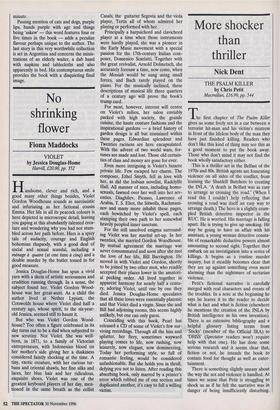No shrinking flower
Fiona Maddocks
VIOLET by Jessica Douglas-Home Harvill, £20.00, pp. 352 Handsome, clever and rich, and a good many other things besides, Violet Gordon Woodhouse sounds as narcissistic and infuriating as her fictional cousin Emma. Her life in all its peacock colours is here depicted in microscopic detail, leaving you gaping at this abundantly talented crea- ture and wondering why you had not stum- bled across her path before. Hers is a spicy tale of audacity, courage and English bohemian rhapsody, with a good deal of social and sexual scandal, including a ménage a quatre (at one time a cinq) and a double murder by the butler tossed in for good measure.
Jessica Douglas-Home has spun a vivid yarn with a skein of artistic seriousness and erudition running through. In a sense, the subject found her. Violet Gordon Wood- house was her great-aunt. As a child the author lived at Nether Lypiatt, the Cotswolds house where Violet died half a century ago, whose spirit, to the six-year- old Jessica, seemed still to haunt it.
But who was Violet Gordon Wood- house? Too often a figure celebrated in its day turns out to be a dud when subjected to new scrutiny. Not Violet. She was well- born, in 1871, to a family of Victorian entrepreneurs, with Indonesian blood on her mother's side giving her a duskiness considered faintly shocking at the time. A tiny, exotic creature, with her curious tur- bans and oriental shawls, her fine silks and laces, her blue hair and her ridiculous, exquisite shoes, Violet was one of the greatest keyboard players of her day, men- tioned in the same breath as the cellist CasaIs, the guitarist Segovia and the viola player, Tertis all of whom admired her playing or performed with her.
Principally a harpsichord and clavichord player at a time when those instruments were hardly played, she was a pioneer in the Early Music movement with a special passion for the 17th-century Italian com- poser, Domenico Scarlatti. Together with the great revivalist, Arnold Dolmetsch, she accurately foresaw a time, now come, when the Messiah would be sung using small forces, and Bach rarely played on the piano. For the musically inclined, these descriptions of musical life three quarters of a century ago will prove the book's trump card.
For most, however, interest will centre on Violet's milieu, her salon enviably packed with high society, the grande cuisine, the haute couture fashions and the inspirational gardens — a brief history of garden design is all but contained within these pages. Edwardian splendour and Twenties raciness are here encapsulated. With the advent of two world wars, for- tunes are made and lost. Those old certain- ties of class and money are gone for ever.
Even more intriguing is Violet's bizarre private life. Few escaped her charm. The composer, Ethel Smyth, fell in love with her, as did the lesbian novelist, Radclyffe Hall. All manner of men, including homo- sexuals, fawned over her well into her sev- enties. Diaghilev, Picasso, Lawrence of Arabia, T. S. Eliot, the Sitwells, Raclunani- nov and many more inhabit these pages, each bewitched by Violet's spell, each stamping their own path to her somewhat heavily peopled inner sanctum.
For the still unsolved enigma surround- ing Violet was her marital set-up. In her twenties, she married Gordon Woodhouse. By mutual agreement the marriage was never consummated and soon after she met the love of her life, Bill Barrington. He moved in with Violet and Gordon, shortly to be joined by two other men, who readily accepted their places lower in the amatori- al pecking order. All lived together in apparent harmony for nearly half a centu- ry, adoring Violet, until one by one they died. Jessica Douglas-Home speculates that all these loves were essentially platonic and that Violet died a virgin. Since she and Bill had adjoining rooms, this seems highly unlikely, but one can only guess.
Coinciding with this book, Pearl has released a CD of some of Violet's few sur- viving recordings. Through all the hiss and splutter, her fiery, sometimes wayward playing comes to life, now rushing, now leisurely, now elegant, now domineering. Today her performing style, so full of romantic feeling, would be considered unfashionable. But she holds you in thrall, defying you not to listen. After reading this absorbing book, only marred by a printer's error which robbed me of one section and duplicated another, it's easy to fall a willing victim.


















































































 Previous page
Previous page